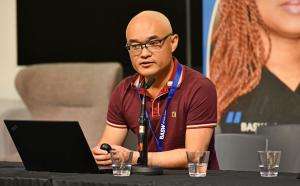‘We are not administrators, we’re there to be alongside people’
Published by Professional Social Work magazine, 22 June, 2022
An appeal for compassion towards refugees and asylum seekers was made during a talk about creating a more peaceful world.
Duc Tran, chair of BASW’s equality, diversity and inclusion advisory group, spoke of his personal experience as a refugee from Vietnam, describing it as “a journey that doesn’t seem to end”.
He said: “Displacement to me is more like a journey of loss because we could never really recover the possessions that we have the homes we had, and the relations that we had.
“And it's an ongoing trauma of losing one's identity and one's sense of safety, particularly in the early part of the journey.”
He recalled being on a boat as a boy held tightly by his mother “because of a fear of either losing me either to the sea, or just losing me to other people who are exploiters”.
The family ended up in an Indonesian refugee camp in “squalid conditions” before finding a home in Australia during the early 80s.
“At that time, I have to say that there was more compassion in the world than what there is today for refugees. And that's probably because of a series of recessions and economic influences that has hardened people's hearts.”
Tran worked as a community development officer in Australia before coming to the UK in 2002, where he found a social care system more focused on processes and hierarchy.
“The first thing that struck me was the top-down approach and the care management processes, which to me was rather odd with the values that I had.
“It was a challenge to practice in this environment, and still remains the challenge for us today.”
He advocates for a “move beyond the processes, inputs and outputs into what I would regard is to reclaim our compassion”.
Ruth Stark, former president of the International Federation of Social Workers, described how the ‘hostile environment’ impacted on a young refugee she worked with in a Scottish prison who faced deportation.
Fleeing Afghanistan with his family to avoid being killed by the Taliban when he was aged four, Ali was resettled in Pakistan when he was 11.
An earthquake there wiped out his family and when he was 13, he was trafficked to the UK becoming an unaccompanied asylum-seeking child.
Not speaking English meant he struggled in his care home and at school and was moved into supported accommodation aged 16. He had a relationship with a girl two years younger than him who became pregnant.
As a result, he was put on the sex offenders register for life and the Home Office wanted to deport him.
Stark said: “As social workers working in the UK with somebody who has been through that kind of trauma, how do we deak with it on a personal individual level as social workers but also how do we tackle the systems that demonise people further than we would ever expect to do with our own citizens?
“This is real discrimination. It's institutional discrimination.”
Stark called for the “social bit” to be put back into social work to build supportive relationships with refugees and asylum seekers.

